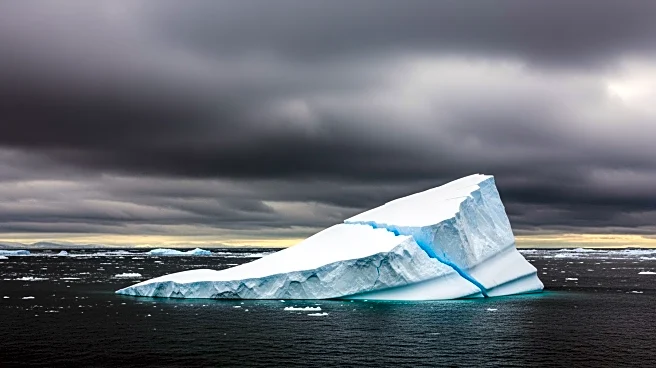What's Happening?
Recent research published in Nature by scientists from The Australian National University and the University of New South Wales highlights the potential for sudden and irreversible changes in Antarctica's
ice, oceans, and ecosystems. The study identifies the West Antarctic Ice Sheet as being at extreme risk of collapse due to rising atmospheric carbon dioxide levels. A full collapse could raise global sea levels by over three meters, posing a threat to coastal populations worldwide. The research also notes a sharp decline in Antarctic sea ice, which could lead to wave-driven collapses of ice shelves. These changes are interlinked, intensifying global pressure on climate systems, sea levels, and ecosystems.
Why It's Important?
The potential collapse of the West Antarctic Ice Sheet and the decline in sea ice could have catastrophic consequences for global sea levels, affecting coastal cities and populations. The loss of sea ice also threatens Antarctic wildlife, including emperor penguins, and could disrupt marine ecosystems by preventing vital nutrients from reaching surface waters. The study emphasizes the urgent need for global reductions in carbon emissions to limit warming and mitigate these impacts. The findings underscore the importance of including Antarctic changes in climate adaptation planning, particularly for regions like Australia that will be directly affected.
What's Next?
The study calls for urgent global action to reduce greenhouse gas emissions and limit global warming to as close to 1.5 degrees Celsius as possible. Efforts through the Antarctic Treaty System remain vital but insufficient to prevent climate-related impacts already unfolding. Governments, industries, and communities must incorporate these accelerating Antarctic changes into their climate adaptation strategies. The research represents a collaboration among leading Antarctic experts from multiple countries, supporting the objectives of the Australian Antarctic Science Decadal Strategy 2025-2035.
Beyond the Headlines
The study highlights the interconnected nature of Antarctic changes and their global implications. The loss of sea ice and potential collapse of ice shelves could trigger feedback loops that amplify regional warming. The research also points to the vulnerability of Antarctic ecosystems, with species like krill and penguins facing major declines. The findings stress the need for comprehensive international collaboration to understand and address the rapid changes occurring in Antarctica.









